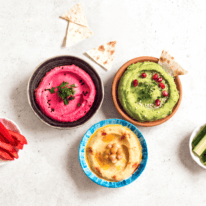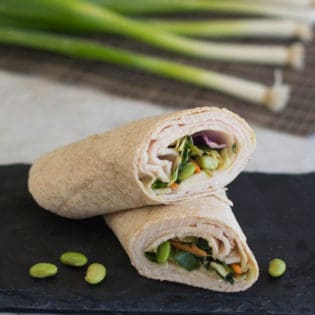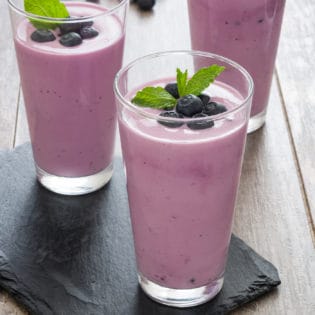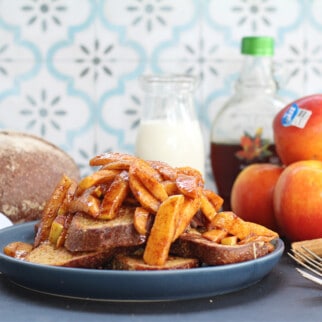Food Rx: Heart-Healthy Benefits of Watermelon
We are collaborating with Julie Harrington, a registered dietitian and culinary nutrition chef, in a monthly series focused on the important role food plays in overall health. Additionally, we will share heart-healthy recipes to help you incorporate more fresh produce into your diet!
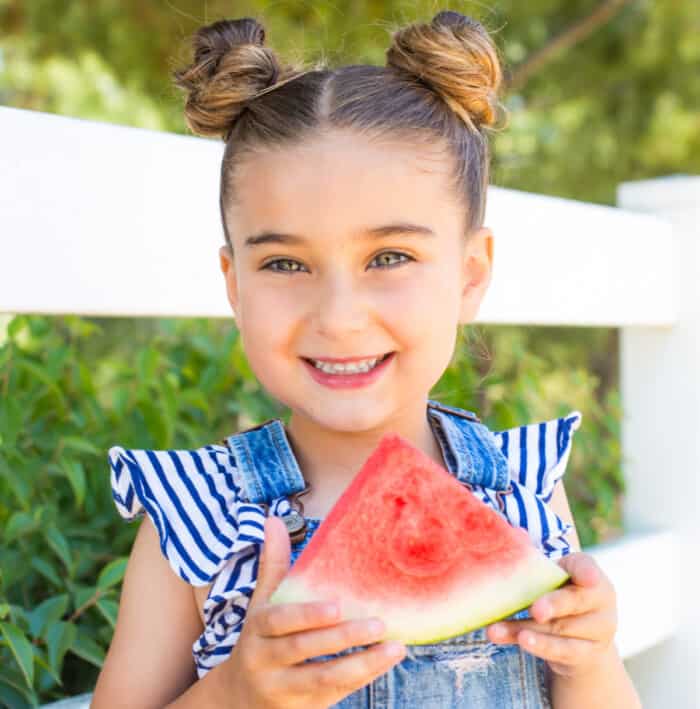
Heart disease is the leading cause of death in the United States, causing roughly 1 in 4 deaths. While this sounds scary, lifestyle changes like eating a healthy diet (watermelon is a heart-healthy food!) and getting regular exercise can greatly reduce your risk for heart disease.
We’re exploring why heart health is so important, the heart-healthy benefits of fresh watermelon and how to pair other heart-healthy foods with watermelon below.
Why is heart health important?
The heart plays a very important role in our bodies. It provides a steady flow that carries oxygen, fuel, hormones, and essential cells to every part of the body.
You are never too old or too young to begin taking care of your heart. Taking steps to follow a heart-healthy lifestyle at any age can prevent heart disease and lower your risk for a heart attack or stroke.
Eating a Heart-Healthy Diet
What we eat can make a big impact on protecting our hearts. There is no quick fix. The key is balanced eating for the long haul. A heart-healthy diet should focus on consuming:
- Fruits & vegetables
- Whole grains
- Lean protein
- Healthy fats
A heart-healthy diet also limits added sugars, sodium, and saturated & trans fats. Healthy eating for your heart should focus on the overall dietary pattern of intake instead of focusing on just one food or nutrient. Nothing fancy – just back to the basics.

Tips for eating a heart-healthy diet:
- Eat more fruits and vegetables. A diet full of fruits and vegetables is linked to healthier hearts due to their fiber content and powerful antioxidants. Remember to eat the rainbow (and we’re not talking about Skittles here!). Need a little recipe inspiration? We got you covered!
- Swap to whole grains. Whole grains contain the whole grain, including the bran, germ, and endosperm, providing more nutrients than refined grains that get stripped during processing. Whole grains provide dietary fiber, B vitamins, vitamin E, and healthy fats.
- Swap to healthy fats. Healthy fats are unsaturated fats, which are monounsaturated and polyunsaturated fats. A few examples are to swap out butter for olive oil, mayo for avocado, chips for nuts.
- Experiment with more spices and herbs. Too much sodium can increase the risk of developing high blood pressure, a major risk for heart disease. When cooking, explore your cabinet and experiment with the many spices and herbs to season food instead of just relying on salt.
Did you know? Salt’s purpose is to enhance the other flavors within the recipe. Salt is not meant to be the main source of seasoning in cooking.

What are the heart-healthy benefits of watermelon?
Watermelon proudly (and deservedly) is American Heart Association Heart-Check Certified. Watermelon also contains nutrients that support heart health, like magnesium (6% DV), which helps keep the heartbeat steady and phosphorus (2% DV), which has a role in the electrical activity of the heart.
Did you know? Watermelon is cholesterol-free, fat-free, sodium-free, and has 80 calories per serving!
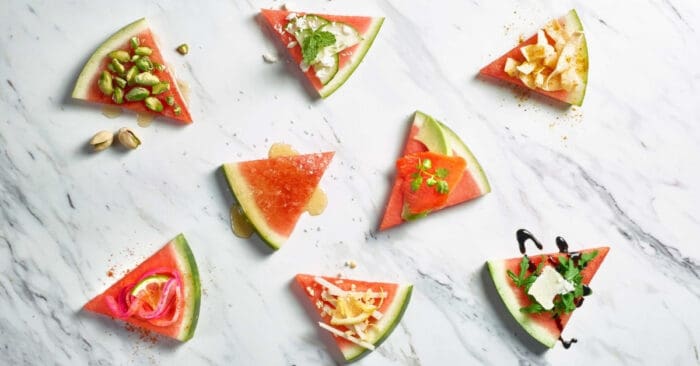
An exciting area of study is the role of lycopene (a carotenoid found in watermelon and other red produce) in maintaining heart health. Lycopene (12.7 grams of lycopene per 2 cup serving) has been studied for its potential to reduce blood pressure in those with prehypertension or hypertension.
Whether consuming watermelon will achieve the results shown in this study in the general population is not yet known. Further research is needed with larger sample sizes and a longer duration is needed to fully determine the clinical implications.
Heart-Healthy Foods You Can Pair with Watermelon
It’s always watermelon season! From the U.S. to Mexico, watermelon refreshes and awakens year-round. While the word “watermelon” alone conjures up moments of free-spirited summertime—family BBQs, lazy beach days, and seasonal soirees—the reality is that watermelon is always nearby. This is thanks to the diversity of climates that enable watermelon to grow and thrive within arm’s reach of U.S. grocery stores and restaurants.
While watermelon is delicious as-is, pair it with other heart-healthy ingredients to enhance those flavors. Watermelon has a juicy, sweet taste. Try pairing these ingredients to enhance your palate by balancing the sweet taste.
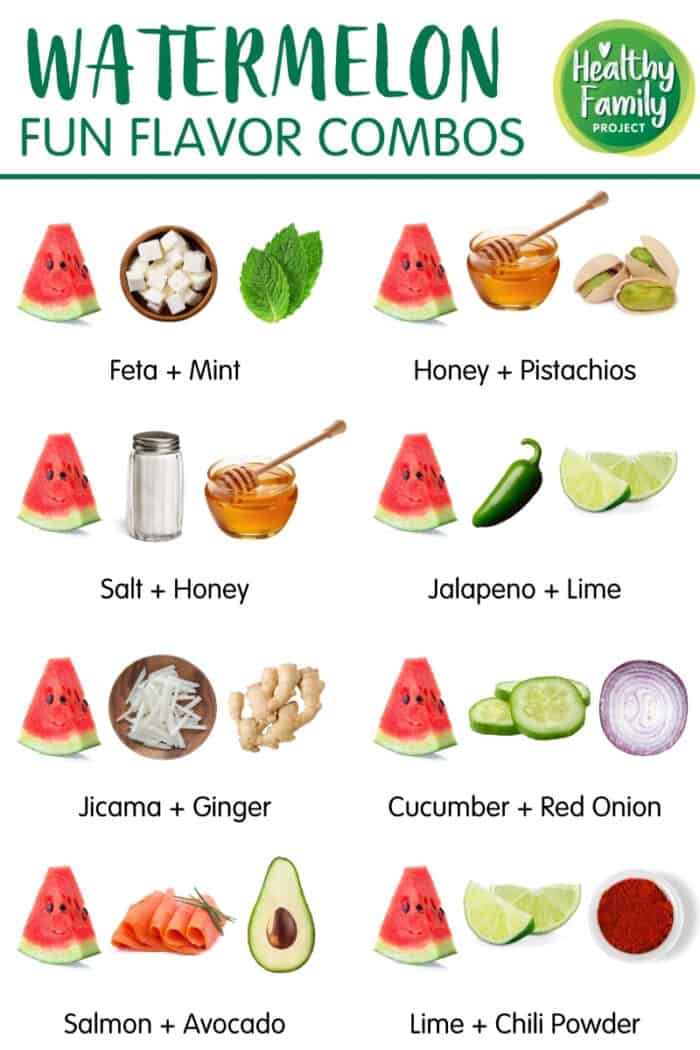
Cheese
Cheese adds a pop of savory and salty when paired with watermelon. Try combinations like:
- Watermelon + arugula + parmesan + balsamic
- Watermelon + feta + mint or basil
- Watermelon + goat cheese + tomatoes
Honey
Drizzle or dip with honey to enhance the sweetness levels. Try combinations like:
- Watermelon + honey + pistachios
- Watermelon + honey + lemon juice
- Watermelon + honey + salt
Salt
Salt enhances the flavors of other ingredients. A sprinkle of salt to watermelon alone can make watermelon taste even sweeter.
- Watermelon + salt
- Watermelon + salt + honey
- Watermelon margherita with a salted glass rim
Spice
Add some heat! Counteract the sweet with a fiery flare. Try combinations like:
- Watermelon + jalapeno + lime
- Watermelon + onion + lime + chili
Citrus
Citrus can add brightness to watermelon by adding acid. Try combinations like:
- Watermelon + lime + poppy seeds
- Watermelon + jicama + ginger + lemon
- Watermelon lemonade
Other Fruits & Veggies
Pair with other refreshing fruits and vegetables. Try combinations like:
- Watermelon + cucumber
- Watermelon + cantaloupe + mint
- Watermelon + cucumber + red onion
Salmon
Get creative with salmon (which is full of its own heart-healthy benefits). Try combinations like:
- Watermelon + avocado + smoke salmon + cilantro
- Grilled salmon with watermelon salsa
- Salmon watermelon sliders

Looking for more watermelon inspiration? Try these recipes:
- Watermelon Cucumber Smoothie
- Holiday Watermelon Snack Board
- Baked Fish Tacos with Watermelon Rind Slaw
- Watermelon Rind BBQ Sauce
- Watermelon Salsa
Disclaimer: Before making any health or diet changes, please consult your doctor. The information shared as part of Food Rx is meant to be informative but not replace medical advice from your doctor.
Feel great about making this recipe! Not only are you creating something delicious, but you’re also supporting a cause. This post, along with others that feature our amazing brand partners National Watermelon Promotion Board, helps fund donations to Feeding America food banks. In 2023, an estimated 47 million people—about 1 in 7 Americans—faced food insecurity, according to Feeding America. Healthy Family Project has provided 22 million meals through our partnerships since 2014. Your visit helps sustain these donations, and we truly appreciate your support!




